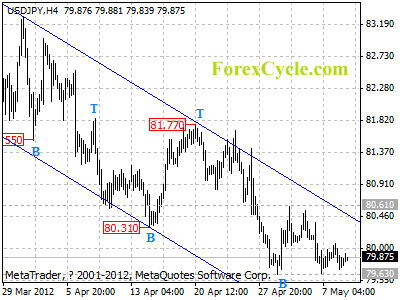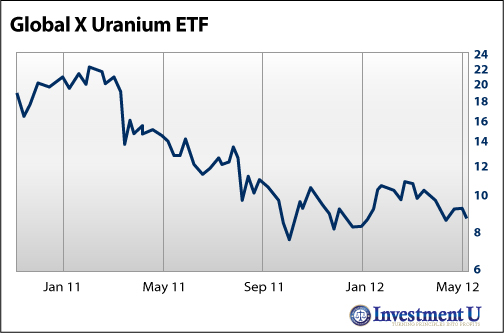Friday, the price of West Texas Intermediate (WTI) crude oil, the benchmark oil contract traded on the NYMEX, fell 4% ($4.14). The one-day decline is the steepest since WTI fell 5.1% ($5.12) on January 3.
The other major benchmark, London-set Brent, also was hit, but less significantly, falling 2.6%. It was the largest Brent decline since a 4.6% dive on December 14.
However, the Brent-WTI spread is now increasing again. As of the close on Friday, the spread as a percentage of the WTI price (the better way of looking at it) stood at 14.9%, the highest differential in more than two weeks.
Two important questions follow.
First, why did this happen? Second, what is that spread again telling us?
The answers will surprise you.
Roll Out the Usual Suspects
As crude oil prices fell, TV pundits immediately paraded the usual suspects. They cited disappointing U.S. job figures, renewed concerns over European debt in general, and the Spanish situation in particular, while so-called “analysts” clamoured over a possible double-dip recession.
These concerns are not new, nor are they revelations.
Plus, the essential reasons why the oil price should be moving in the opposite direction – namely up – haven’t gone anywhere. The constriction produced by supply/demand considerations remain, and the insufficient volume available to meet unexpected demand surges and the geopolitical environment – especially the impending European boycott of Iranian crude oil imports – remain in full force.
The overall market dynamics still point strongly to a rise in oil price.
Yet the overall movement of crude oil futures has remained peculiarly restrained. In fact, WTI has given back 6.1% in the past week, and some 2.7% for the month.
Here’s what’s really happening…
Preparing for the Next Crude Oil Price Rise
The real reason we have witnessed a retreat in crude oil pricing has little to do with the condition of the market or the actual demand for product. It is the result of a classic yo-yo short in anticipation of a major advance in the oil price.
In other words, some very large traders in oil futures contracts – the so-called “paper-barrel” speculators of future actual consignments of oil (or “wet barrels”) – are manipulating a short-term cut in price after establishing a position that will profit with the price going down.
This amounts to a “put” clone resulting in an exaggerated decline in the crude oil pricing level, usually orchestrated on a five-day pricing spread introduced by a sequenced derivative move on the futures contract itself.
The trader profits when the price goes down by exercising the “put” to sell options on the futures contract at a higher strike price than that provided by the market by redeeming the derivative.
Of course, when that happens, the market price will increase. The trader then profits again by having derivatives on the increasing price already in place.
The price is manipulated just like a yo-yo moving up and down. Now the manoeuvre is only doable during periods of lower-than-average futures contract volume and a narrow period in which the price is not likely to spike because of outside developments (for example, natural disasters, a rapid escalation in hostilities, blockage of transit, collapse in production, and so on).
It becomes less useful when the market indicators themselves are decidedly moving up. The approach succeeds by wider market perceptions, not fact. It ends when the actual pricing dynamics take over. In between, a few traders make some bucks by manipulating the margins.
There will be little opportunity for this device to operate again as we move into the summer volatility.
The Iranian Embargo Looms
As for the second question, that widening Brent-WTI spread is signaling a renewed concern about the real market impact coming from the EU-Iranian embargo and the increasing inability of other producers to make up the difference over the long term.
Saudi Arabia has agreed to cover the initial shortfalls to the most highly vulnerable European importers – Greece, Spain, and Italy. But that additional volume will not guarantee price moving forward. And it will also result in both price increases and market dislocations in other regions relying on Saudi exports – Asia especially and, in particular, India.
Spain attempted to secure additional oil from Nigeria but was told the African producer could not cover additional needs resulting from the embargo. Russia may benefit in the near term, but that will certainly increase prices paid by Europe.
All of this is reflected first in Brent because it is the benchmark most impacted by these developments. However, it will be translated into rising WTI prices as well, since the price in the U.S. is still reflective of the price in Europe due to imports.
The increasing spread, therefore, tells what is really going to happen.
Crude oil is going up.
Despite what a few very large short artists will pull off now and then in the hazy funny paper world of exotic derivatives.
Dr. Kent Moors
Contributing Editor, Money Morning
Publisher’s Note: This article originally appeared in Energy & Oil Investor
From the Archives…
Why China’s New Consumer Economy Won’t Give You the Trade of the Decade
2012-05-04 – Kris Sayce
Why China Could Be The Next Destination For the Financial Crisis
2012-05-03 – Merryn Somerset Webb
How Did We Get It So Wrong on Australian Housing?
2012-05-02 – Kris Sayce
This Indicator Shows the Copper Price Could Be Set to Soar
2012-05-01 – Dr. Alex Cowie
How Gold Nanoparticles Will Create A New Kind of Gold Rush
2012-04-30 – Michael Robinson



 Tradervox (Dublin) – Mixed data is seen coming out of the Australian economy. Today early in the morning hours the Australian economy posted Trade Deficit figures. The country’s trade deficit for the month of March doubled to $ 1587 million from previous $ 754 million. This was the highest trade deficit the country has recorded in the past two and half years. In other data coming from Australia the retail sales rose significantly indicating that consumption is gaining momentum in the country, which also reflected in an increase in the business confidence numbers.
Tradervox (Dublin) – Mixed data is seen coming out of the Australian economy. Today early in the morning hours the Australian economy posted Trade Deficit figures. The country’s trade deficit for the month of March doubled to $ 1587 million from previous $ 754 million. This was the highest trade deficit the country has recorded in the past two and half years. In other data coming from Australia the retail sales rose significantly indicating that consumption is gaining momentum in the country, which also reflected in an increase in the business confidence numbers. Tradervox (Dublin) – The pound weakened against the US dollar today after a report by a London-based Royal Institution of Chartered Surveyors showed that the UK house price index fell to six month low in April. The demand for houses weakened after a stamp-duty exemption for first time buyers ended in March 24. The index fell to -19 from -11 in March registering the lowest level since June 2010. A reading below zero indicates that more surveyors registered a price drop than gains in the last month. This report came as Britain’s property market struggles to recover from the first double-dip recession in the country since 1975.
Tradervox (Dublin) – The pound weakened against the US dollar today after a report by a London-based Royal Institution of Chartered Surveyors showed that the UK house price index fell to six month low in April. The demand for houses weakened after a stamp-duty exemption for first time buyers ended in March 24. The index fell to -19 from -11 in March registering the lowest level since June 2010. A reading below zero indicates that more surveyors registered a price drop than gains in the last month. This report came as Britain’s property market struggles to recover from the first double-dip recession in the country since 1975. Tradervox (Dublin) – The Australian dollar was just shy of this year’s low after the nation reported a more-than expected trade deficit. This has compounded already existing concerns that the spending cuts carried by the government will dampen the nation’s economic growth. The country’s budget will be announced on July 1 by Wayne Swan. The Aussie has dropped after gaining yesterday as riskier assets regained their losses after Europe election results on Sunday. The kiwi continued with its longest losing spell in six years as Greek political leaders met for the second day to try and form a coalition government.
Tradervox (Dublin) – The Australian dollar was just shy of this year’s low after the nation reported a more-than expected trade deficit. This has compounded already existing concerns that the spending cuts carried by the government will dampen the nation’s economic growth. The country’s budget will be announced on July 1 by Wayne Swan. The Aussie has dropped after gaining yesterday as riskier assets regained their losses after Europe election results on Sunday. The kiwi continued with its longest losing spell in six years as Greek political leaders met for the second day to try and form a coalition government.